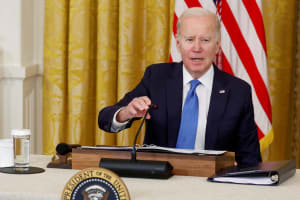Biden administration officials downplay Netanyahu's claim about White House visit
US president struggles to find balance between support for Israel and criticism of Israeli government

U.S. President Joe Biden's administration pushed back against the claim by Israeli Prime Minister Benjamin Netanyahu that he had been invited for an official visit to the White House.
When questioned about the meeting during a phone briefing, U.S. National Security Council Spokesperson John Kirby said, “We still anticipate that the president will meet with Prime Minister Netanyahu sometime in the latter part of this year in the fall, and it’ll be somewhere in the United States.”
Some experts expect Biden to meet with Netanyahu during the upcoming United Nations General Assembly meetings in September, which both leaders are attending. However, an unofficial meeting like that would be considered lower profile than discussions held at the White House.
Netanyahu has been trying to downplay the level of tension between his coalition and the Biden administration.
The prime minister’s office described the July 17 phone call between Biden and Netanyahu as “warm” and stated that Biden had invited Netanyahu to meet with him.
There were conflicting reports regarding the phone call, with the White House phone call readout showing no indication of the invite.
During interviews with ABC News and NBC News last month, Netanyahu doubled down on the claim that he had been invited to the White House.
The Biden administration has consistently expressed its concern about Netanyahu’s coalition partners and the coalition’s judicial reforms.
Meanwhile, some in Israel and the U.S. argue that Biden is playing political games, undermining Netanyahu, while at the same time supposedly trying to negotiate a normalization deal between Israel and Saudi Arabia.
The last time there was such a deliberate suspension of high-level relations was in 1975, during the administration of then-U.S. President Gerald Ford, when the president and Secretary of State Henry Kissinger announced the administration was “reassessing” its relationship with Israel.
The hostile attitude of Biden’s administration towards Netanyahu, along with Biden’s promise to turn Saudi Arabia into a “pariah state” over human rights abuses, has raised skepticism about U.S. efforts to negotiate a deal between the Saudi Kingdom and the Jewish state.
Some analysts have even suggested that Biden’s push for a deal is a re-election strategy, intended to improve his ratings against former U.S. President Donald Trump, currently the frontrunner for the GOP Republican nomination. The historic Abraham Accords peace agreements were signed during Trump’s administration in 2020, and his support for the accords is considered a crucial part of their ratification.
Against this backdrop, some see Netanyahu’s decision to visit America's rival China, as a pointed message to Biden, indicating that other world leaders are willing to meet with him.
Other analysts argue that Biden runs a political risk if he isolates Netanyahu too much. Many Republican presidential candidates have made Israel a key issue in their election campaigns.
Former U.S. Vice President Mike Pence recently said, “This preoccupation of the Democrats, which literally goes back decades, of trying to micromanage what's happening in the domestic politics in Israel is wrong-headed.”

The All Israel News Staff is a team of journalists in Israel.
You might also like to read this:
















